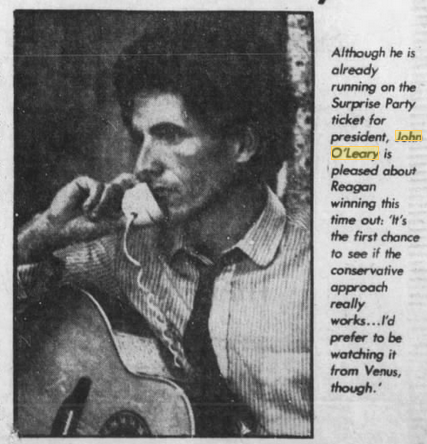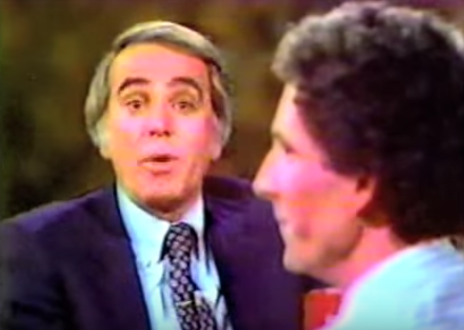LaDonna Vita Tabbytite Harris, February 26, 1931 (Temple, Okla.) -
VP candidate for Citizens Party (aka Independent aka Consumer Party) (1980)
Running mate with nominee: Barry Commoner (1917-2012)
Popular vote: 222,072 (0.26%)
Electoral vote: 0/538
The campaign:
The Citizens Party was formed in 1979 by a group of political progressives who were disenchanted with what they viewed as the corporate centrism of the Carter administration. The headliner and chief organizer was Barry Commoner, an academic and environmental scientist who had been an activist against nuclear power. Others involved in the founding of the Party included Gray Panthers leader Maggie Kuhn, Mario Savio, and Studs Terkel. The
Washington Post said the Citizens Party was "blessed by Ralph Nader." Nader had apparently been offered the CP Presidential nomination, but turned it down. Former Yippie Abbie Hoffman also endorsed the Citizens Party as well.
The lengthy platform included disarmament of nuclear and chemical weapons, constrain multi-national corporations, wider use of the United Nations and World Court, open relations with Cuba and Vietnam, abolish the CIA, progressive taxation, encourage the growth of small business and co-ops, reduce the military budget, phase out nuclear power, national recycling program, public control of utilities, pro-choice, national health service, eliminate ROTC, increase minimum wage, pro-Affirmative Action, strengthen OSHA, pro-labor unions, national gun control, pro-ERA, no peacetime draft registration, rent control, development of mass transit.
The CP also ran candidates for the US House, US Senate, and local levels.
Commoner, the Presidential nominee, while not exactly a socialist did make an effort to link the abusive side of capitalism with environmental degradation. Today's eco-socialist movements embrace Commoner's writings as part of their philosophical foundation.
The Citizen's Party was not a huge blip on the radar in the news media during 1980 as I recall-- John Anderson had pretty much sucked all the air out the room for the other third parties. But I do remember the main stunt Commoner performed in the campaign to gain attention and make his point. No doubt from frustration for being squeezed out of the mainstream national discussion while attempting to bring up serious issues, the Citizens Party used shock talk and employed the campaign motto of "Bullshit" on radio ads. "Carter, Reagan, and Anderson: It's all bullshit," a voice declared, followed by Commoner saying, "Too bad people have to use such strong language, but isn't that how you feel too?" You have to remember this was in 1980 before profanity was so freely used by elected officials as it is today and public comments in the pre-Internet world didn't immediately sink to the lowest common language denominator.
In order to qualify for filing in the early states Wretha Wiley Hanson, the widow of and fellow agitator with civil rights activist George A. Wiley, was used as a stand-in running-mate for Kentucky and Ohio. Hmm. "stand-in running-mate" sounds like a contradiction in terms, how can one stand and run at the same time?
At the contentious Party convention (where the Black Caucus walked out) LaDonna Vita Tabbytite Harris was nominated as running-mate and on the ballot in all the other states where Commoner was running-- except in Tennessee. For some reason Commoner did not have a VP on the ballot with him in that state although all the other Presidential candidates there did.
As a Comanche, Harris was touted as the first female Native American Vice-Presidential candidate-- but that honor actually belongs to Ramona Frances Crowell, part of the Assiniboine people. Crowell was one of Dizzy Gillespie's running-mates in 1964. But Harris was certainly the first to have ballot status.
Harris was also connected with DC insiders by virtue of being the spouse of US Sen. Fred Harris (D-Okla.) at the time.
Although
Wikipedia states "Commoner did not garner more than one percent in any state, the party received enough support to be the first minor party to qualify for federal matching funds (about $157,000) for the 1984 election," in fact the Party did win more than 1% in Oregon (1.15%), Vermont (1.09%), and DC (1.05%). I always love zinging
Wikipedia on these details.
On the ballot or registered write-ins in 30 states, in addition to the three top percentages mentioned above, Commoner/Harris' other strongest results were: Maine 0.84%, Virginia 0.75%, California 0.71%, Washington 0.54% (which I think included my brother!), and Hawaii 0.51%.
Election history: none.
Other occupations: founder and President of Americans for Indian Opportunity, author, member of way too many boards and commissions to list.
Notes:
Harris invited controversy 2012-2019 by defending and adopting Johnny Depp when the actor was
under accusations of being a Pretendian, cultural appropriator, and perpetuating stereotypes of
indigenous Americans through his acting roles and advertisement appearances.
Endorsed Bernie Sanders in 2016.
Full disclosure: I supported Sen. Fred Harris for President at my caucus in 1976. Here in Washington
State the Scoop Jackson people had it all locked up, of course.
Brush with fame: I knew someone who once went a hike with Mario Savio. Those are the kinds of
brushes with fame I have.















